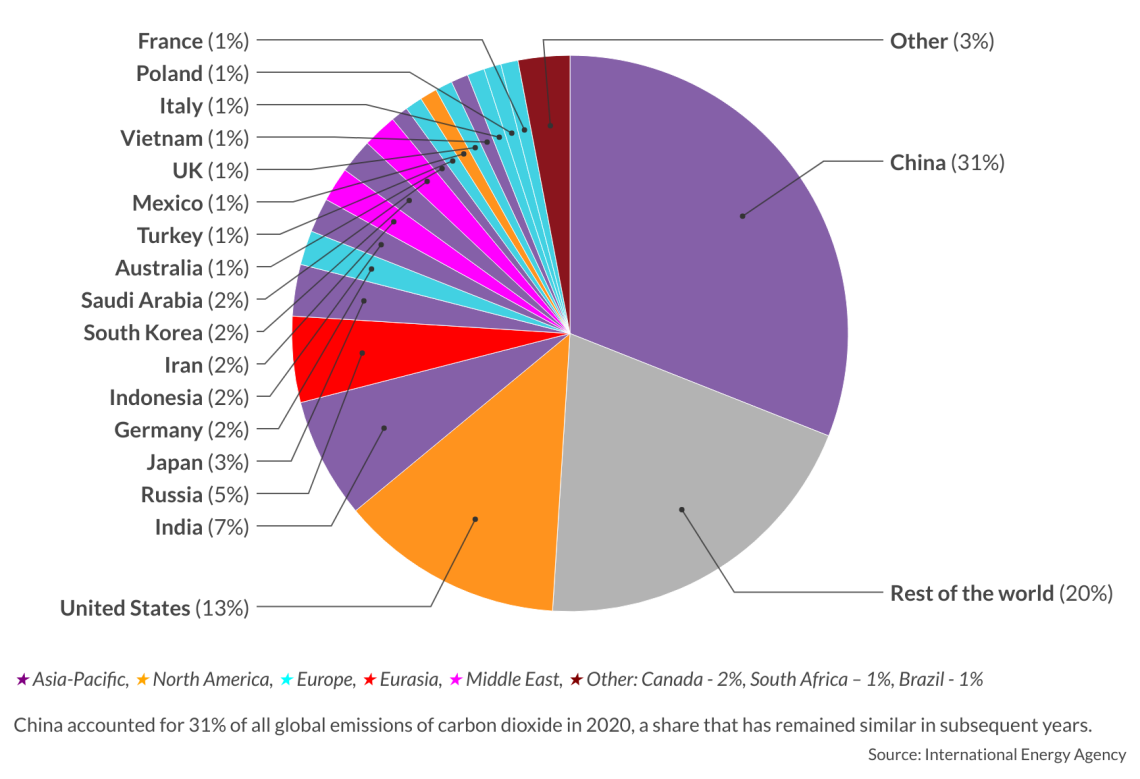The threat from China is no fairytale
Our snug democracies have become extraordinarily complacent in identifying the threats that could so easily destroy our way of life.
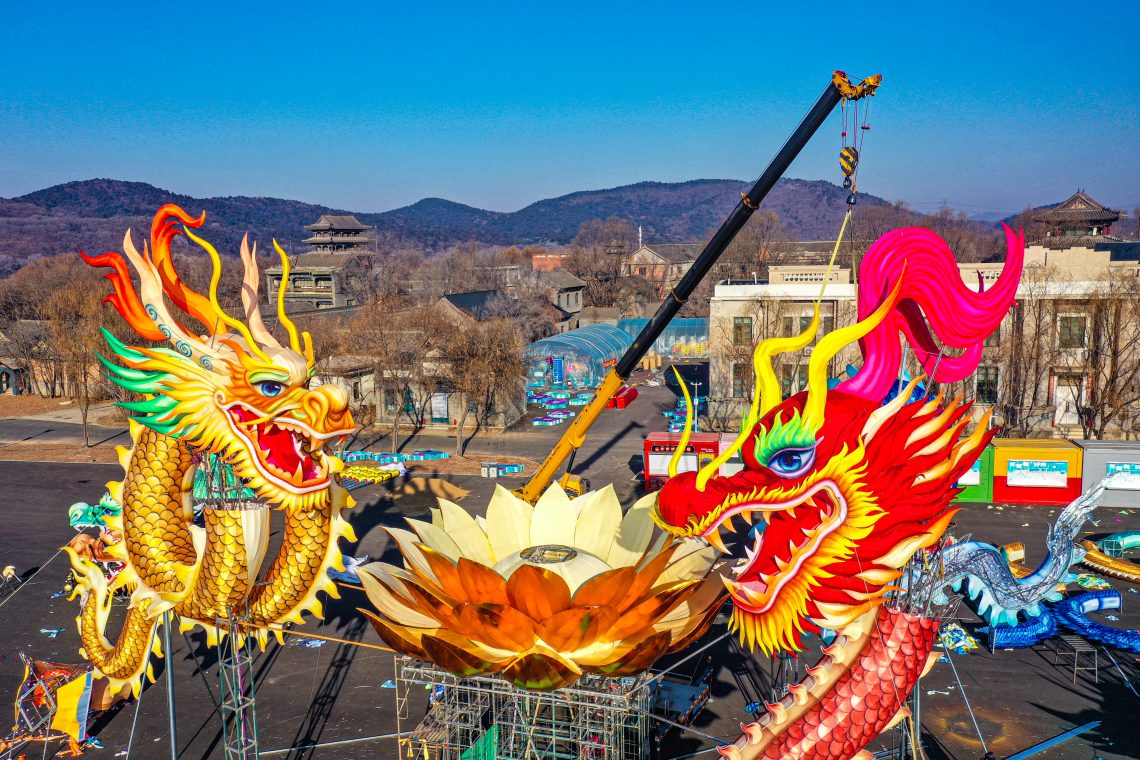
In a nutshell
- Threats to liberal democracies are not only external but internal as well
- China leads a dangerous axis that includes Russia, Iran and North Korea
- The competition with autocracies will be a long and arduous one
Dragons are the stuff of children’s stories. They are portrayed as fire-breathing evil in the European chivalric tradition, representing untamed nature and chaos pitted against and slain by gallant knights.
Fans of J.R.R. Tolkien – I among them – will be familiar with Smaug, the last great dragon of Middle Earth. Tolkien’s dragons were avaricious and greedy, mendacious and malicious, cunning, seductive, endowed with enormous physical power and strength and with an insatiable appetite for gold.
Smaug the Dragon is in league with Sauron, chief lieutenant of “the Dark Lord.” They seek total dominance of Middle Earth. But in the fateful narrative played out in Tolkien’s “The Lord of The Rings,” the inconsequential hobbits discover that Smaug has one weak spot. Armed with that knowledge, Smaug the Dragon was slain by Bard the Bowman.
Not make-believe: The dangers from China
So much for the fantasy, the riddles and the runes; there is nothing chimeric or fantastical about the real-time global dangers posed by the dragon in the Middle Kingdom of China.
In our snug democracies, we have become extraordinarily complacent in identifying the threats that could so easily destroy our way of life. And we fall back on crumbs of comfort such as China’s stuttering economic performance or occasional reports of internal discontent.
Part of the problem is attention deficit – the inability to patiently chip away until we have overcome our adversary – and the world’s difficulty in multitasking. European countries are already showing signs of tiring of their support for President Volodymyr Zelenskiy’s brave Ukrainians struggling against a Russian enemy determined to wear them down through long-term attrition. The United States’ commitment is even more tenuous – and increasingly threatened by former President Donald Trump’s reelection campaign.
In “Hamlet,” Shakespeare has Claudius observe that “when sorrows come, they come not single spies, but in battalions.” The eruption of war in the Middle East – and the danger of regional escalation – plays into our inability to manage more than one crisis at a time – which, of course, suits Russian President Vladimir Putin. If, under the cover of this darkness, China decides to invade Taiwan, it would catastrophically heighten the prospect of a third world war.
It would be a huge error to see these wars and events as isolated from one another. China has made no secret of its desire to create an entirely new world order and, notwithstanding Chinese President Xi Jinping’s recent public relations meeting with U.S. President Joe Biden, he is determined to create the circumstances in which he can assert the hegemony of the Chinese Communist Party (CCP).
More by Lord David Alton
Genocide and the fight for humanity
Forever wars
The global crisis of religious persecution
Xi rallies the enemies of liberal democracy
It suits President Xi to be seen as the interlocutor of choice by the U.S., and he calculates that it elevates his standing. Yet he simultaneously dives deeper and deeper into military and self-interest relationships with the enemies of liberal democracy.
Note the developing relationship with Afghanistan’s Taliban and their visits to Beijing. The CCP runs an atheistic state that persecutes Uighur Muslims and the Taliban are Islamists who have imposed a theocracy that persecutes anyone who refuses to comply and denies women and girls education or equal status.
This alliance of strange bedfellows is driven by the dragon’s insatiable lust for the hoarding of raw materials – Afghanistan’s rich deposits of barite, chromite, coal, copper, gold, iron ore, lead, natural gas, oil, precious and semi-precious stones, salt, sulfur, talc, zinc and, of course, lithium. In return, the Taliban receives recognition and sells its assets for money to be used in the pursuit of their hostile ideological objectives.
There are plenty of other states that are also willing to sell their souls in the service of the dragon.
President Xi has placed himself at the head of an axis, accompanied by President Putin, North Korean leader Kim Jong-un and Iran’s Ayatollah Ali Khamenei. They are every bit as dangerous as the axis that confronted World War II allies. President Xi says his pact with President Putin has “no limits.” I was in the Gulf region a few months ago when Russia, China and Iran were staging joint military exercises (Security Bond-2023) and there are unverified reports that North Korean weapons have been used by Hamas in its war against Israel.
We in the West have an intrinsic problem in the lack of resilience and even belief in our civilizational values.
It would be a mistake to see this alliance of dictators, theocrats, authoritarians and jihadists as separate threats. Their ideological differences will be parked temporarily as they use one another to pursue their shared hatred of the free world and its democracies.
The threat is not from tyrants alone. There is an interior challenge too. We in the West have an intrinsic problem in the lack of resilience and even belief in our civilizational values. We too often forget who we are and what made us who we are. Winston Churchill uttered a warning which has a particular contemporary resonance:
“When one generation no longer esteems its own heritage and fails to pass the torch to its children, it is saying in essence that the very foundational principles and experiences that make the society what it is are no longer valid. What is required when this happens and the society has lost its way is for leaders to arise who have not forgotten the discarded legacy and who love it with all their hearts.”
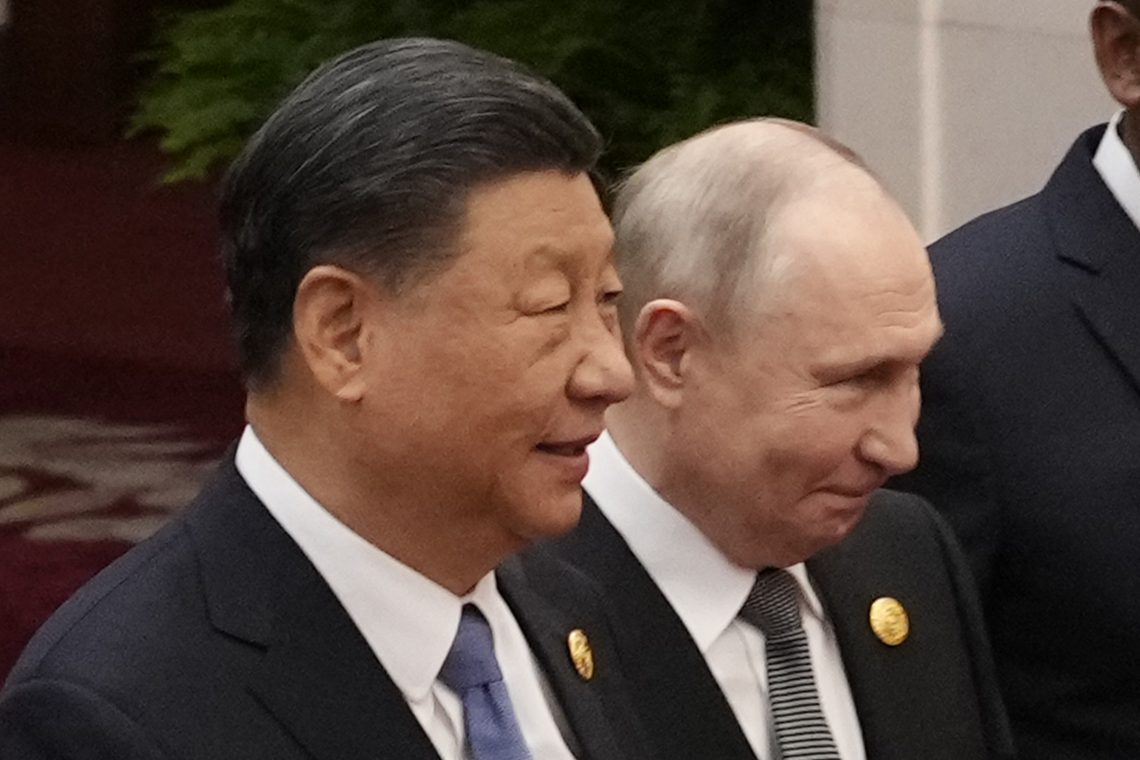
Playing into the hands of Xi and Putin
President Xi sees us as weak and has frequently attacked Western values and multi-party democracy. President Putin mistakenly believed we would not defend our way of life. Although the brave Ukrainians proved him wrong, it is easy to see why he came to that conclusion.
Mr. Xi’s declared ambition is for the CCP regime to become the dominant world power by 2049, when his Communist Party will be 100 years old. Whether the fight to save Ukraine will be enough to deter him from invading and appropriating Taiwan and its 23 million free people remains to be seen.
All that said, China’s economy is stuttering, and old enmities with Russia might resurface, not least in Central Asia where they have competing interests and visions. But these are dangerous times, and our alliances must be renewed, strengthened and deepened.
In the aftermath of World War II, when the world was mourning the deaths of 15 million military personnel, 38 million civilians and six million people, predominantly Jews, murdered in the Holocaust, liberal democracies were at the fore in creating a rules-based order.
The United Nations, the Universal Declaration of Human Rights (UDHR), the Convention on the Prevention and Punishment of the Crime of Genocide, the International Court of Justice, the Bretton Woods Agreement, the Marshall Plan, Europe’s Coal and Steel Community and, of course, NATO, were all manifestations of the overwhelming desire to create a coherent and effective architecture of international cooperation.
But not everyone embraced this vision.
From the very start, there was always the problem of the Soviet Union and other communist countries modeling themselves on totalitarian lines. The Islamic non-democratic world was also divided about whether they would embrace human rights and become more inclusive societies.
China, meanwhile, was engulfed, between 1945 and 1949, in a civil war between Chiang Kai-shek’s nationalist Kuomintang and Mao Zedong’s communists. Facing defeat, on December 8, 1949, the nationalists moved their capital to Taipei on the island of Taiwan (Formosa) and by the end of the year virtually all of mainland China was under Communist control.
No regime or organization in global history has killed more people than the CCP.
In the years that followed and until he died in 1976, Mao and the CCP developed Mao Zedong Thought, a variant of Marxism-Leninism, which held that the revolution could be developed in China’s agricultural pre-industrial society. His policies – everything from the Great Leap Forward to the Cultural Revolution – led to vast numbers of deaths, estimated to range from 40 million to 80 million. Mass starvation and mass executions, prison labor and persecution on grounds of ethnicity, religion and political dissent were the hallmarks of a truly evil, despotic regime. No regime or organization in global history has killed more people than the CCP.
As the CCP extended its tentacles, Maoism was exported to the developing world, especially Africa. It also gradually asserted itself on the world stage.
Henry Kissinger made a secret visit to China in 1971 and it paved the way for the formal recognition of the People’s Republic of China (instead of Taiwan) as a member of the United Nations. In turn, that led to a visit by President Richard Nixon and the normalizing of U.S.-PRC relations.
But China was anything but a normal country. Through the Red Guards of the Cultural Revolution, it unleashed a brutal campaign of reeducation of its citizens, terrorized any form of nonconformity and viciously crushed traditional ways of life in places like Tibet.
Post-Mao dissenters courageously took to the streets in 1989 when student and worker protests erupted into massive demonstrations in Beijing’s Tiananmen Square. Red Army soldiers and tanks turned those expressions of dissent into a massacre. It is hard to look at the photographs of “tank man,” a solitary protester who stood in front of the military might of the People’s Liberation Army, and not be enormously inspired.
Indeed, that same inspiration would be at the heart of the pro-democracy movement in Hong Kong after the CCP reneged on the 1984 international treaty creating “one country, two systems.” The commitment was supposed to come into effect in 1997 when Hong Kong would revert to China after 150 years of British rule.
If two systems in one country could be made to work, many saw it as a potential model for rapprochement with Taiwan and for the incremental embrace of other liberal democratic values. During the leadership of Deng Xiaoping, Jiang Zemin and Hu Jintao, China increasingly embraced market economics, but it hesitated over radical political reform.
Any hopes of such change evaporated in 2013 when President Xi made clear his ambition to turn China into the world’s one superpower and with the elevation of Xi Jinping Thought to emulate Mao in imposing his own cult of personality and authoritarianism.
But there are inherent dangers in this, too. The failure to reform a creaking, unsustainable system can be laid at his door alone.
He has made many moves that will all come back to haunt him: Rising debt, high youth unemployment, the catastrophic demographic consequences of the one-child policy (rescinded in 2016), the collapse of the property sector, the inability of a political system to deliver change and an economic model that is neither fish nor fowl – and now scaring away foreign investors and their much-needed cash.
The more President Xi tells the Chinese people he will solve all the nation’s problems, the more he will be blamed for failing to do so. That’s in the DNA of totalitarianism.
And, in consolidating his power, he will have made enemies within the elites – and it does not take much wit to see the inherent and obvious contradictions in his Maoist-Market ideology.
This “president for life” has introduced the mass surveillance of citizens – not least in Xinjiang, where he has had over one million Uighur Muslims interned in genocidal concentration camps for use as forced labor. The CCP tightly controls all media and internet and has extended its tentacles into every aspect of life.
Upending the rules-based order
In Hong Kong, he has destroyed “one country, two systems” and introduced laws that have strangled democracy, with 1,200 pro-democracy activists, legislators, journalists and others incarcerated. The heroic stand of the jailed British citizen, Jimmy Lai, puts him on a par with tank man.
While President Xi has tightened his internal grip on power, he has also consolidated his hold on international institutions – and undermined their ability or willingness to uphold the rules-based order.
Look at North Korea. It brazenly threatens its neighbors with weapons of mass destruction and openly sends 1,000 containers of weapons and munitions to Russia for use against Ukraine.
Look at what has been happening in Sudan, where thousands of lives have been lost and millions displaced. The ravages of the Rapid Support Forces in Darfur are leading to a new genocide. But the world has not been looking and it is not interested.
Think of the 100,000 Armenians ethnically cleansed from their ancient homeland in Nagorno-Karabakh by Azerbaijan, with Turkish support. What have international institutions done about that or Turkey’s use of white phosphorous in attacks on Kurds in Northern Syria and Iraq?
Or think of the Iranian proxies in Lebanon and Yemen doing the bidding of their paymasters in Tehran. Or the military junta in Myanmar, massacring pro-democracy demonstrators and ethnic minorities. Or the Taliban in Afghanistan, who despite their horrific oppression, the CCP welcomed to Beijing after the chaotic and ill-starred withdrawal from Kabul. Meanwhile, in Latin America, China’s influence is growing and no one should doubt its support for Venezuela’s authoritarian regime, whose president, Nicolas Maduro, is greedily eyeing and plotting the annexation of up to two-thirds of neighboring Guyana.
While the world has been sleepwalking, the Chinese dragon has been sharpening its fangs. Nor should the world believe that the CCP is content to live within the borders of the PRC.
The world has let it get away with the appropriation of the United Nations and many of its agencies despite having a pernicious worldview inimical to our own.
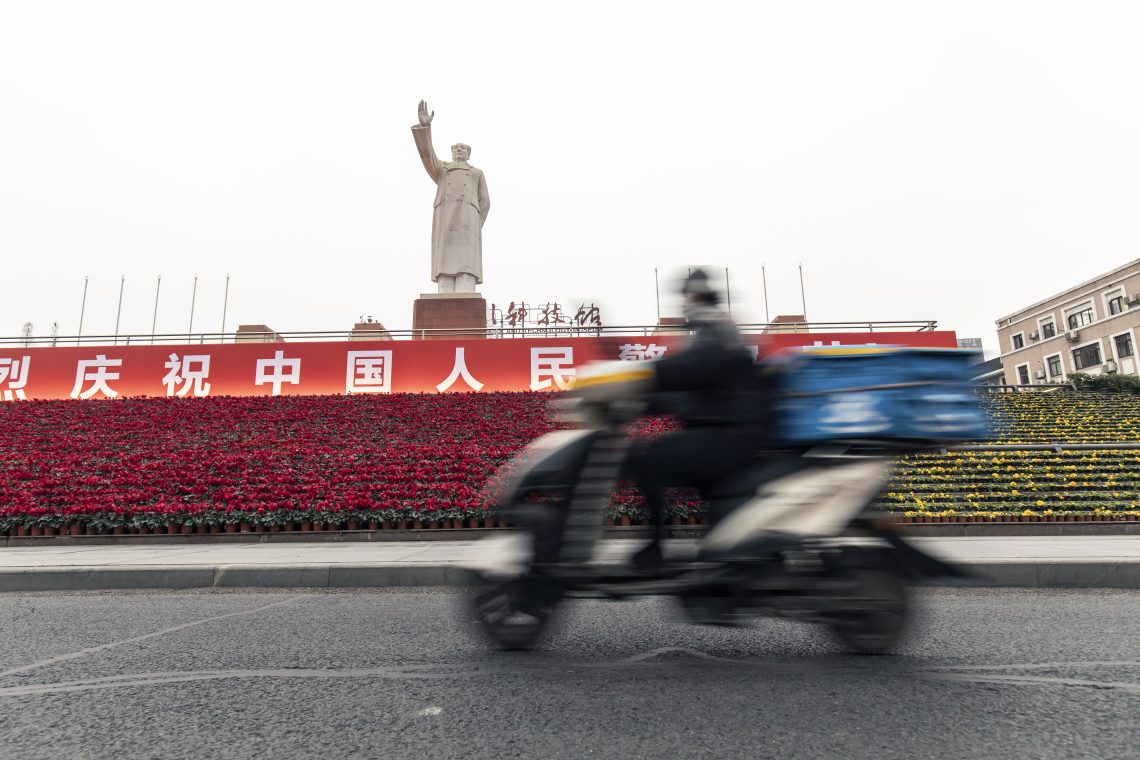
Beijing’s new form of colonialism: Indebted nations
To secure votes at the UN, China has had no hesitation in using its Belt and Road Initiative (BRI) to lend to, and heavily indebt, many nations. World Bank data suggests that 12 percent of the debt burden of African countries is now owed to China and Chinese lenders – with Angola and Ethiopia the two leading recipients of Chinese loans.
In Asia, the $1.4 billion Sri Lankan Port City Colombo project began with a President Xi ribbon cutting in 2014. This project was approved despite the danger that this could be a Chinese military bridgehead in the Indo-Pacific, with few benefits for Sri Lanka. A United Kingdom parliamentary committee stated that the involvement of the UK foreign secretary (former Prime Minister David Cameron) may have been “engineered by the Chinese state” to lend credibility to the project and to “the broader China brand.”
The BRI’s new variation of colonialism has President Xi’s signature stamped all over it. The BRI turns recipients into vassal states who are required to do its bidding in UN institutions and agencies.
In October 2023, with President Putin at his side, President Xi marked the BRI’s 10th anniversary. It has invested more than $1 trillion in 148 countries with combined populations of over 5 billion people.
China has walked into the void as other countries have retreated. The UK has cut its development aid by a total of 7 billion GBP since 2019 – and 29 percent of the remaining budget is now being used to host refugees within the UK.
Even the Commonwealth, with 2.4 billion people, spread across 56 countries, is increasingly neglected by the UK as the CCP scents further opportunities.
Artificial intelligence and the new surveillance state
In extolling the BRI, President Xi gave a concluding speech that included an ominous announcement to create a global initiative on artificial intelligence – ominous because of the precedent of using facial recognition technology in Xinjiang’s surveillance state.
AI is a tool that the CCP will share with other authoritarian states enabling them to impose iron fist control of their citizens. Doubtless, it will aid and abet spying with Chinese characteristics – as we have seen, even in the British Parliament, with CCP spies found to have been operating freely.
But beyond surveillance, what security and military dangers are posed by AI in the hands of hostile states – including its use in biological warfare?
Recall, too, that during the Covid-19 pandemic, China’s subversion and control of United Nations agencies was graphically illustrated in the role of the World Health Organization, which receives significant funding from China.
The World Health Organization has often seemed like the CCP’s mouthpiece. The censoring of key scientific and medical data explains why there has been no independent investigation into Covid-19’s origins.
And, of course, China has prevented Taiwan, with a population of 23 million people, from membership in the WHO and threatens it every day with military intimidation.
It tells us all we need to know that when the brave journalist, Zhang Zhan, went to Wuhan to document the origins of Covid-19 – and to ask all the right questions about a pandemic that claimed at least 3 million lives – she was jailed for four years. She remains in jail where she has been forcibly made to end her hunger strike – in violation of the convention against torture, to which China is party.
The CCP wants hegemony for its ideology – wholly antithetical to the values on which liberal democracies are founded.
Look at the 30 Articles of the 1948 UDHR and try to find articles that China has not breached. The CCP has unleashed a crackdown on civil society, lawyers, bloggers, journalists and dissidents across China. Article 19 of the UDHR – the right to seek information and express opinions – is breached every single day.
Article 18 insists on the right to believe, not to believe or to change belief.
Yet, Buddhists are persecuted, not least in Tibet; Christians are in prison; Falun Gong practitioners allege forced organ harvesting, while Uighur Muslims suffer genocide.
When the UK and others sought a debate on Xinjiang and on the findings of the UN’s High Commissioner for Human Rights, China ensured that compliant states at the UN Human Rights Council rejected the motion. Even Islamic countries like Pakistan voted against. So much for solidarity with the Uighur Muslims. Whose bread I eat, his song I sing.
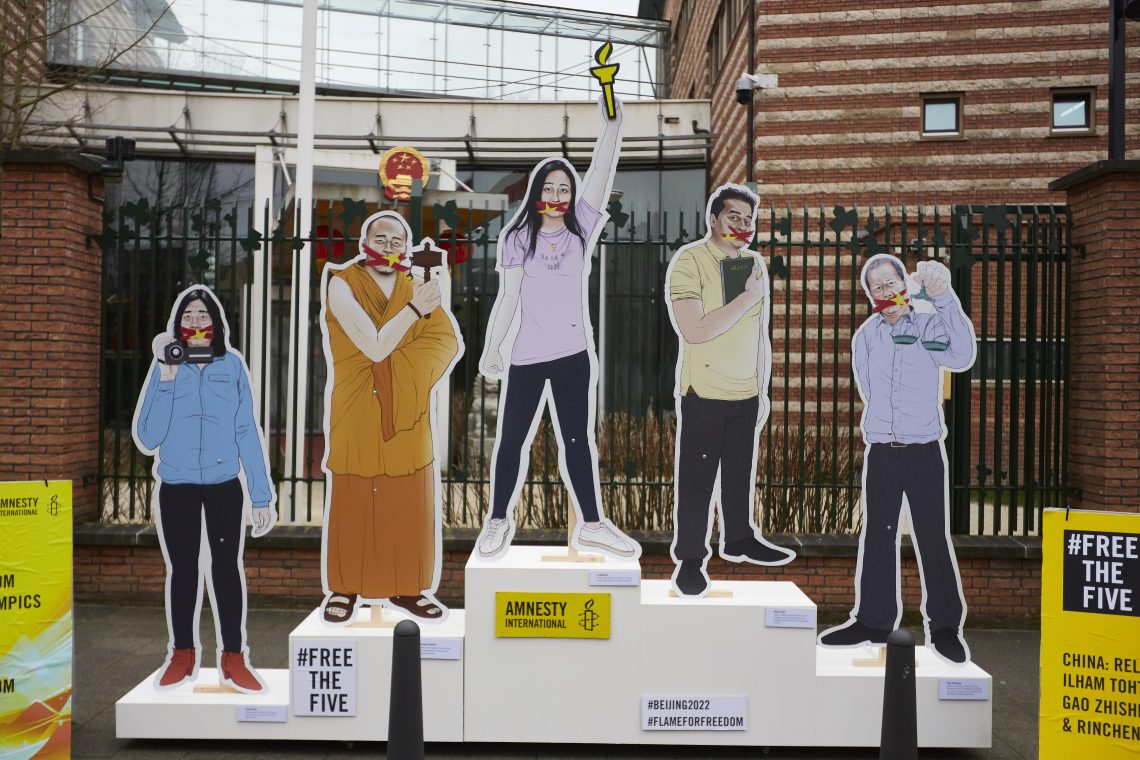
Persecution of the Uighur minority
Dolkun Isa, president of the World Uyghur Congress, whose mother died in a Xinjiang camp and whose two brothers are missing, expressed his dismay that other Muslim countries including Qatar, UAE and Indonesia voted against the motion. Pakistan cited the risk of alienating China.
In addition to being in breach of Articles 18 and 19, the CCP regime is in breach of UDHR Articles 3, 4, 5, 6, 9, 10, 11, 14 and others as well.
In timidly refusing to criticize China or to uphold the UDHR, the UN has revealed itself as a hollow man.
Time and again Beijing has used the threat of Security Council vetoes to prevent referrals of its vassal states, like Burma or North Korea, to the International Criminal Court.
In 2013 a UN Commission of Inquiry found evidence of crimes against humanity in North Korea, naming it as “a state without parallel” and comparing its depredations to those of the Reich.
The inquiry found North Korea was responsible for “extermination, murder, enslavement, torture, imprisonment, rape, forced abortions and other sexual violence, persecution on political, religious, racial and gender grounds, the forcible transfer of populations, the enforced disappearance of persons and the inhumane act of knowingly causing prolonged starvation.”
Despite knowing this the CCP – in contravention of the 1951 Refugee Convention – has been repatriating North Korean escapees into the clutches of its ally. This is despite the willingness of the Republic of Korea’s President Yoon Suk Yeol to accept and resettle every one of the detained escapees.
To consolidate its ability to sneer at the world and its values, the CCP regime ensured its election to the UN Human Rights Council – like putting the fox in charge of the hen coop.
To try and redeem something of the reputation of the paralyzed Security Council, France has suggested the removal of the Security Council veto, at least in the case of atrocity crimes (the roadblock used by Russia and China). France is right and should take that proposal to the General Assembly.
The new axis of dictators and authoritarians consists of differing ideologies but is united in their hostility to a rules-based order, human rights and the rule of law. They are united in their hostility to the foundational documents of 1948. It has become open season for rogue states who believe that they can get away with murder.
Our enemies believe that the free world is fragmented and incapable of defending itself and its values. They think we care only for self-interest and not the common good; that we are unable to work together in our approach to international challenges. They take comfort from the possibility of a second Trump presidency and the failure of the Republican Party to rediscover the spirit of Ronald Reagan. They believe the Democrats are weak and more interested in fringe issues than defining ones. Our enemies believe all of this, and we need to prove them wrong.
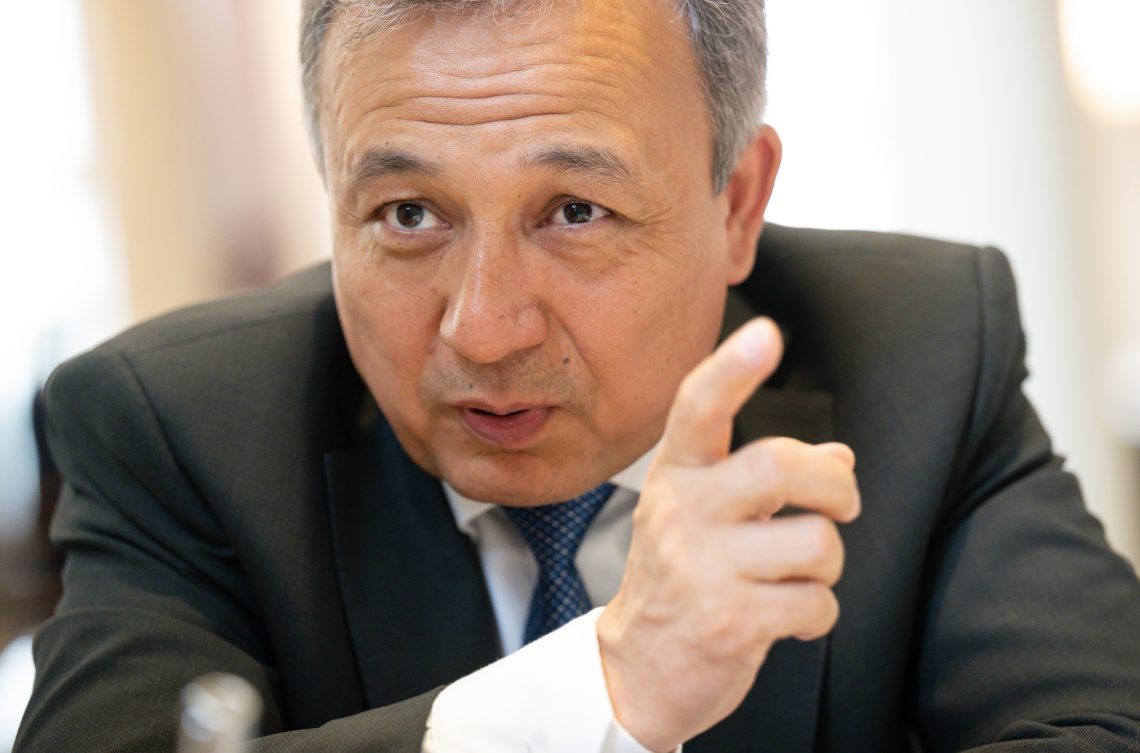
The 2024 elections will be revealing
With elections in 2024 in the U.S., the UK and EU as well, Presidents Xi and Putin will be hoping to see a further weakening of resolve and the distraction of principal players. In the U.S. there is a particularly disturbing trend among some Republicans to think they can sit out Ukraine and turn a blind eye to China’s aggression. They would do well to remember the warning of President Franklin Roosevelt in 1940 who told the American public that they could not ignore the consequences of a victory by the axis of Hitler, Mussolini and Tojo’s Japan. He said their world would be “a shabby and dangerous place to live in – yes even for Americans to live in.” And before they discount his view as those of a Democrat, let me also recall Republican President Ronald Reagan, who, in 1984 on the 40th anniversary of the D-Day landings in Normandy, said: “We’ve learned that isolationism never was and never will be an acceptable response to tyrannical governments with an expansionist intent.”
The need to stay the course
Together, we need to simultaneously stay the course in Ukraine, the Middle East and the Far East.
This will be through the strengthening of hard power alliances – through NATO and AUKUS. And through smart power, through networks like the Commonwealth, through our development programs and through the open promotion of our shared values with like-minded nations.
As for the UN, if it is to survive and not become part of this new world order, it must be fundamentally reformed; those who believe in it must lead by example and be relentless in exposing its subversion and corruption.
Its principal mission must be to protect the sovereignty of all nations, from the Levant to the Horn of Africa, from Ukraine to Myanmar, from Taiwan to the Korean Peninsula, and wherever people are oppressed or at risk, stand with them and do more than make weak tea and offer statements of concern.
The great polluter
We all know that dragons wallow in sulphurous caves snorting fire. Perhaps that is why China is responsible for around a third of global CO2 emissions. By way of contrast, it has pumped out more pollution in eight years than the UK has in 220 years. It is building the equivalent of two new coal-burning power stations every week. It is doing this to build its industrial and military might and certainly not to do its bit toward tackling climate change. We need to spell out their responsibility, on this and many other world-threatening issues, instead of being coaxed and cajoled into deferential begging.
Facts & figures
How to deal with the enemy in our midst
But none of this will be achievable if we fail to urgently deal with the enemy in our midst.
The UK’s parliamentary committee which deals with intelligence and security recently gave significant warnings about the CCP’s infiltration of institutions and agencies. It was followed by a report from Civitas documenting over 140 million British pounds paid to UK universities by Chinese companies – some involved in military projects.
More than 40 UK universities have links with institutions that are tools of the Chinese state, including institutions complicit with, facilitating or directly involved with the Uighur genocide, nuclear development, military research, espionage and hacking.
The committee began its report by saying: “China’s national imperative continues to be the continuing dominance and governance of the Chinese Communist Party. However, it is its ambition at a global level – to become a technological and economic superpower, on which other countries are reliant – that represents the greatest risk to the UK.”
The report explores what it calls “the multifaceted nature of the intelligence threat posed by China” and warns us that China pursues a “whole-of-state” approach, meaning that “Chinese state-owned and non-state-owned companies, as well as academic and cultural establishments and ordinary Chinese citizens, are liable to be (willingly or unwillingly) co-opted into espionage and interference operations overseas.”
Most alarmingly, the committee concludes that China has been able to “successfully penetrate every sector of the UK’s economy”; that “Chinese money was readily accepted by the government with few questions asked”; and that external experts concluded “very strongly that the government does not have any strategy on China, let alone an effective one.”
It took a tough parliamentary campaign to stop vested interests that have too great an influence on the government, giving China control of 5G telecommunications.
It has taken another campaign to get Chinese surveillance cameras (there are one million of them in the UK) out of sensitive sites, including military sites. The next campaign will center on Chinese-made electric cars – or even simply Chinese-made cellular modules that are components in non-Chinese-made cars and other electronic equipment – which could be used to spy on us.
The lack of action to identify and protect UK citizens and assets from a known threat was, the report argues, “a serious failure, and one that the UK may feel the consequences of for years to come.”
The report concluded that without “swift and decisive action” a “nightmare scenario” could emerge whereby China represented not just a “commercial challenge, but … an existential threat to liberal democratic systems.”
The bottom line reveals the scale of the problem. Currently, the UK has a trade deficit of 40 billion pounds with China and has traded resilience for dependency. Chris Patten (Lord Patten of Barnes), the last governor of Hong Kong, has criticized the UK government for “cakeism” – to have your cake and eat it too – wanting to have both strong security and an open-ended trade relationship. It would not have been possible or desirable with the communist Soviet Union and it is not desirable with the CCP regime either.
But trade visits by UK ministers have been accelerated – even while several British parliamentarians, this writer included – are sanctioned by the CCP for voicing criticism of their actions in Hong Kong and Xinjiang.
It was instructive that Sir Sherard Cowper-Coles, a former British diplomat who until recently was HSBC’s head of public affairs, described Britain as “weak” for siding with the United States against China.
But that is not true.
It is we who have been too weak in failing to stand up to the CCP.
If UK businesses are in doubt about the nature of the regime with which they are dealing, they should meet Peter Humphrey, the British businessman and journalist who described to me and parliamentary colleagues his two and a half years in Chinese jails, some of the time with 12 men in a cell.
Instead of such a confused and confusing approach in dealing with China, we need to make it clear that it is perfectly possible to admire the people, culture and civilization of China while opposing the brutal CCP dictatorship that rules China, currently led by Xi Jinping.
China represents an epoch-defining threat and systemic challenge to liberal democracies like the UK and we have been sleeping at the wheel. The writing has been on the Great Wall of China for years – we need to be much clearer-eyed in reading it.
Dragons can be defeated. Tolkien’s dragon, Smaug, and his ally, Sauron, were ultimately overcome. But his adversaries needed to look for the fatal flaw, the vulnerable point. They were prepared and willing to steel themselves for a long and arduous epic struggle. And so must we.
For industry-specific scenarios and bespoke geopolitical intelligence, contact us and we will provide you with more information about our advisory services.

